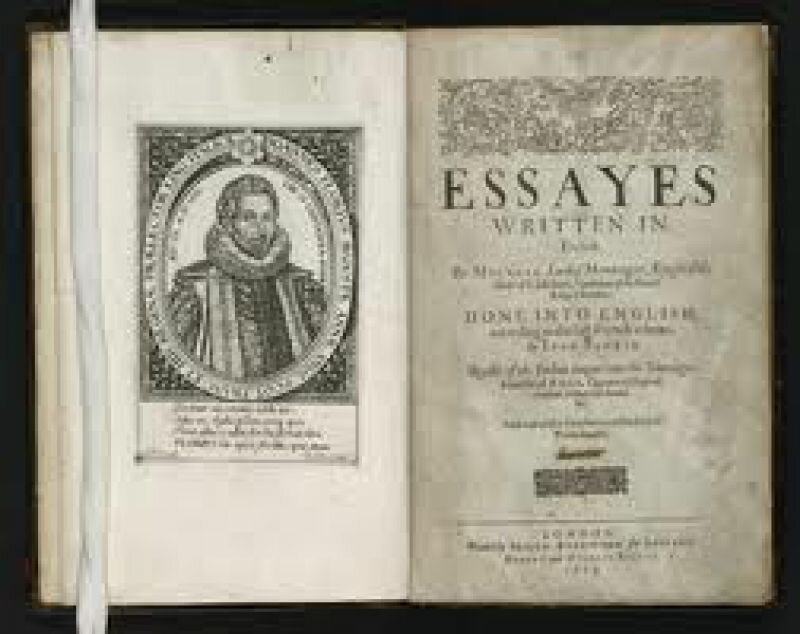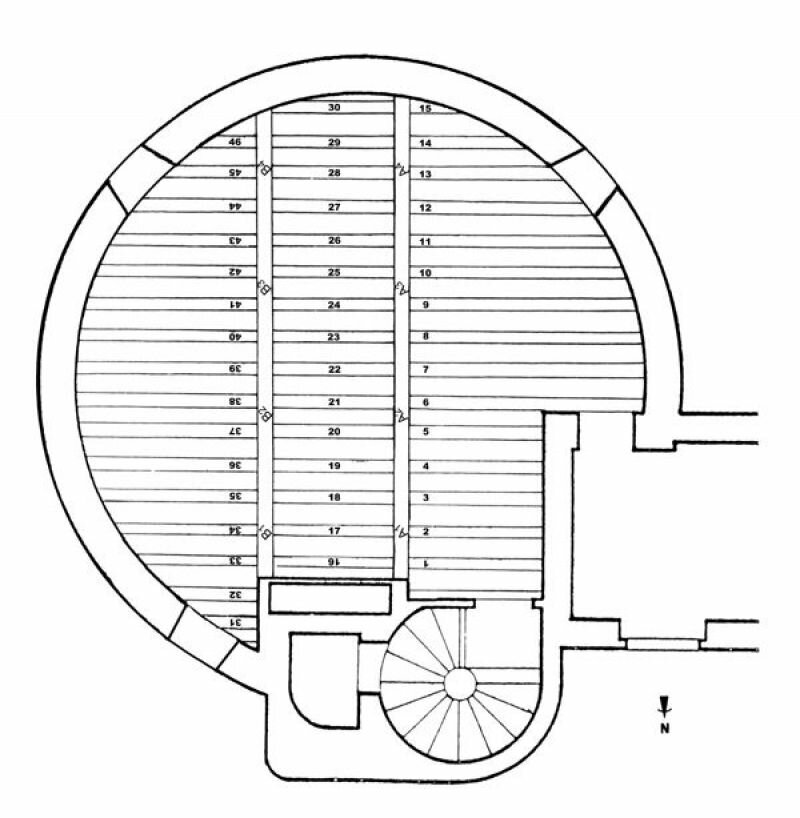
Portet van Michel de Montaigne
In our day and age it would be impossible to physically transport yourself to the 16th century, unlike in the Middle Ages when bilocation was still deemed possible. You may have found professor Barabas’ time machine quite useful. Otherwise a word of advice from Negro Kaballo, the horse from Erich Kästner’s De 35ste mei might be of use. I’ve also considered Hendrik Willem van Loon. As a boy I read his book, Pioniers der Vrijheid, where he receives visits from countless long dead historical figures at his home in Veere. But ultimately, I must to my dismay admit there is but one way— through the mind. This is how I first met Montaigne through his Essais, and it’s how I later found myself in conversation with him.

Portet van Michel de Montaigne
Michel de Montaigne’s library
Mister Montaigne, it is a great honour to be here in your extraordinary library and be granted the opportunity to exchange thoughts with you. My first question, if I may, concerns how you write. Do you have a method, and if so, could you describe this?
Dear sir! My arguments arrange themselves to but one order: coincidence. I record my thoughts just as they enter my mind. At times they appear in such great masses that they crowd one another, at other moments they siphon in one by one. I would like to show how it is in my nature to proceed, however unorganised it may seem. I express my thoughts in the same manner as they manifest. Luckily, the subjects I describe are of such a nature that it would not be unacceptable to speak of them while being essentially ignorant, or by speaking of them in superficial terms. There are certain things I’d like to understand better, but I’m not prepared to pay the price for such insight. I’ve decided to live my life on a pleasant note, avoiding exertion as much as possible. I wouldn’t break my head for the world, not even for science, however worthy it may be. All I expect from a book is for it to entertain me; and when it comes to studying, my sole desire is to know and understand myself and to how to live and die. This is the finish line for which I’ll allow my horse to break a sweat.

You write associatively, do you also read in that way?
When I’ve had enough of one book, I pick up another. I only start reading when doing absolutely nothing begins to bore me. Because I find the classics most rich and exciting, I hardly bother with modern works. I likewise avoid the Greeks because during my youth I learned too little of them to properly understand their literature. There are modern books that I find simply entertaining, like Boccaccio’s Decamerone, Rabelais and The Basia by Janus Secundus. If they belong to that category, they’re certainly worth the attention. The Amadis and similar writings couldn’t interest me, not even in my youth. It may sound audacious or arrogant, but I must admit that my old, slow mind is no longer stimulated by Ariosto, not even by the good Ovidius: his nonchalant, imaginative style that used to spellbind me can now hardly keep my attention.
But you quote many classics in your work. For example, Cicero comes up quite often.
Cicero! Now there’s somebody. I find his way of writing, and for that matter all similar styles, to be irritating. His forewords, explanations, planned formats, and idiomatic discourse take up the grander part of his work. The lively and essential is smothered under his endlessly fabricated sentences. When I’ve read him for an hour, which is a long time for me, I ask myself what I truly gleaned from it. I usually come to the conclusion that he’s merely blasted wind, and that he has yet to come to the arguments that support his plea, and hasn’t even touched upon the core of what interests me. Because I only hope to grow wiser, and not more eloquent or smart, his Aristotelian tricks of reasoning are not my interest.
I prefer for an author to begin with the essence. I’m perfectly acquainted with definitions of death and lust; there’s no need to dissect these terms for me. I long for a plea that immediately cuts into the core of the issue, but his constantly circumvents the essence. I’m not waiting for someone to grab me by the hair and, like a herald, declare “Listen carefully!’ fifty times over.
During their religious ceremonies the Romans said: Hoc age (pay attention), just as we say ‘Sursum cord’ (lift up your hearts) during mass. These words are absolutely redundant for me. Generally speaking, I long for books that supply knowledge, not those that blow air into knowledge. Seneca, Plutarch, Pilinius and their contemporaries do not make use of Hoc age; they want their readers to be on their qui-vive all by themselves.
So you actually find Cicero to be a bit of a nag.
Well. When it comes to Cicero, I share the common opinion that he did not have many exceptional qualities besides his knowledge: he was a good citizen, and kind-hearted like most fat and boisterous folk. But frankly, he was quite a big wimp and his ambition was an exercise in vanity. I can’t forgive him for believing his poetry decent enough for publishing. It’s one thing to write bad verse, but to be ignorant of the blemish that his poetry places upon his glorious name shows an utter lack of insight. But his eloquence is unparalleled. I doubt anyone will ever equal him in that respect.
Thank you for your answers. The future reader will surely have an understanding of how you read and write. Now I’d like to ask you a question concerning a wholly different matter, namely your thoughts on death. One of your statements on death is ‘philosophising is learning how to die’. Could you clarify this for me?
My apologies, but to answer you I must continue on the subject of Cicero. Cicero says that philosophising is nothing more than preparation for death. Study and contemplation, in a sense, detach the mind from one's self and situates it outside of the carnal. This is a condition that is similar to death and within it embeds a lesson; all wisdom and human reasoning eventually teach us to not fear death. Death is inevitable. But, if we fear it, it becomes an on-going source of suffering for which no relief exists. We cannot escape it, regardless if we keep a constant watchful eye as though in enemy territory. Death perpetually hangs over us like the boulder of Tantalus.
So, the final destination is death. We must remain aware of this. But how can we, if we fear death, take one step without falling into a nervous stupor? Any man who hasn’t reached the age of Methusalem will believe he’ll survive another twenty years.
Horatius writes: ‘Take every day as your last. Then, each surplus hour will be a happy one.”
Yes, that’s true. We don’t know where death awaits us, let us expect him at every moment. Awareness of death is awareness of freedom. If you’ve learned to die, you’ve unlearned to be a slave. If you’re prepared for death, you’ve freed yourself from subjection and constraint.


